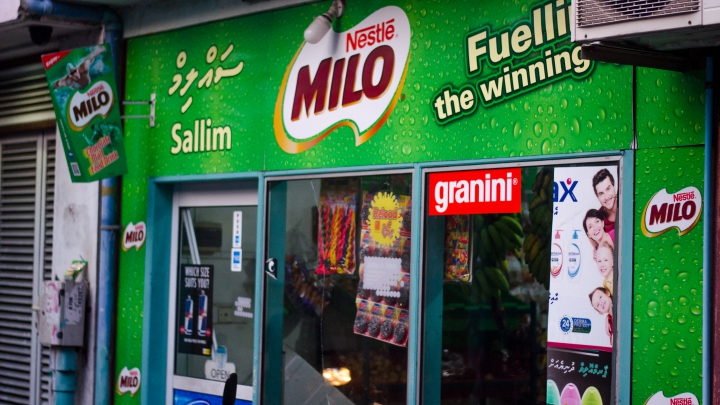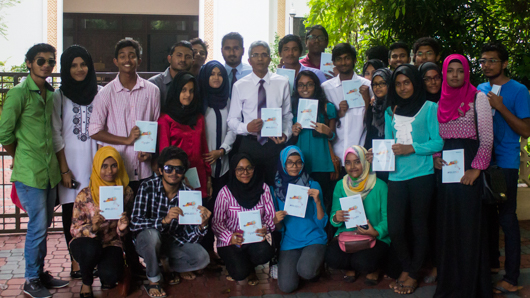Economic development minister Mohamed Saeed has told local media that it will be illegal to hire expatriate workers as cashiers from April 2015.
“A large percentage of the Maldivian youth is unemployed and looking for employment,” Saeed told Haveeru. “All they need is support and guidance”.
Saeed’s announcement closely follows comments made by President Abdulla Yameen yesterday noting that new economic opportunities were being created for Maldivians, not foreign workers.
“This is not to say anything of disrespect to any neighboring or foreign countries,” said the president. “But these jobs are created by the Maldives. Be it in the tourism industry, from hotel industry work to refrigerator work, these jobs are not created for foreigners, but for the Maldivian Youth.”
Yameen’s comments came during the graduation ceremony of the ‘Dhasvaaru 2014’ vocational training programme yesterday evening (December 30).
“The government’s current policy for strengthening the economy is working towards the theme ‘Maldivian work for Maldivians’. The economy is creating jobs, the economy is filling those jobs with Maldivians. This will result in a sound economy,” said the president.
Youth employment has been a major focus of the Yameen administration, which has pledged to create 94,000 new jobs during its five year term.
Economic development minister Saeed is reported to have told Haveeru today that authorities will stop issuing quotas to foreign workers for work as cashiers, after having received a number of complaints.
During yesterday evening’s ceremony, President Yameen reminded the graduates that their job security entirely depended on their work ethic, enthusiasm, and competence – noting that these qualities must be self taught.
“Even if you know how to do the work very well, even if you are very skilled, you will still have to develop proper work ethics on your own.”
Local youth-led NGO Democracy House states unemployment among the youth (aged 15-24) may be as high as 43 percent.
Youth employment
A recent Democracy House publication, however, highlighted a “disconnect” between the current school curriculum and life skills, noting that many were “not able to handle adult responsibilities after we leave school.”
While the government has established a youth unemployment register with 13,000 individuals, youth minister Mohamed Maleeh Jamal has reported receiving complaints from businesses about individuals failing to attend interviews and quitting jobs within a few weeks.
Earlier this month, Maldives Airports Company Ltd head Bandhu Ibrahim Saleem told a Majlis committee that difficulties with local staff had resulted in a dependence on foreign employees, and even military assistance, to keep the international airport running.
After being summoned to the government oversight committee regarding the company’s failure to replace foreign staff with local employees, Saleem informed MPs that 500 employees were currently on leave.
“We loaded and unloaded cargo three times with assistance of army personnel. I don’t think any of you know this. Our employee attendance is low. The process of letting go an employee, so complicated. The foreigners are there to bridge all this,” explained Saleem.
Shortly after his appointment as home minister late last year, Umar Naseer mooted the idea of national service for the country’s youth in order to instill discipline, as well as suggesting that many jobs carried out by foreign workers could be done by locals.
“There is no task too menial or lowly for a Maldivian,” said Naseer at the launch of a ‘Blues for Youth’ camp – organised by the police with the aim of preparing adolescents for the job market.
“None of the work currently being conducted by foreigners in this country is either lowly or dirty work. It is not something that we Maldivians cannot do,” said the home minister.
The 2014 census showed the expatriate population to be 58,683, although Minister of Defence Colonel (retired) Mohamed Nazim – who also heads the immigration department – has said the real figure is more likely to be double this amount.
As part of the government’s drive to reduce undocumented workers in the Maldives, Nazim’s department has deported or repatriated 7,962 undocumented foreign workers so far this year under a voluntary departure programme.
Related to this story
Democracy House launches #policy22 campaign calling for youth participation in policy-making
MACL chief says airport dependent on foreign workers
“There is no task too menial or lowly for a Maldivian”, says Home Minister
Likes (3)Dislikes
(3)Dislikes (0)
(0) 
